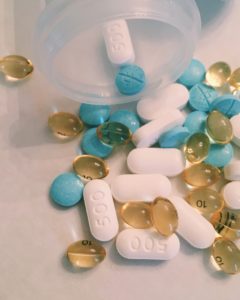Managing Your Medications After Surgery

Once you’re home from the hospital you may have to take painkillers or other drugs in addition to other medications you were taking before your operation.I was taking eight different medications once I got home from the hospital and they weren’t all at the same interval. It was easy to get confused about what to take and when.
How To Keep Track
I created the free, downloadable Medication Tracker to help patients and caregivers manage your post-surgery medications, including what you have taken, when, how much, and when the next dose is needed. It includes space for notes, such as any side effects you experienced.
Sometimes necessity is the mother of invention. A transplant patient I know had to take so many pills in her first year after surgery that she bought a fishing tackle box to keep them all straight.
Some pharmacies also offer free bubble or blister packaging for people who want extra help keeping track of their medications or need to take a lot of them every day. This packaging is designed to avoid confusion and organizes the correct dosage of pills into specific time slots. If you need to take pills at work or on the road, this might be easier than taking all your prescription bottles.
If you always have your phone with you and prefer to use an app, there is a variety of options to help you keep your medications on schedule. Because they all have different features, you may want to research the best match for your needs. MyTherapy and Medisafe are two highly-rated apps for Android and iPhone.
And there are other tools like pill boxes, automatic pill dispensing machines, and more to make things easier.
Partner with Your Pharmacist
A post about medication wouldn’t be complete if it didn’t mention pharmacists as an important part of your healthcare team. As highly trained medication experts, they can also advise you about things like side effects, how best to take your medications, potential drug interactions, and more.
(Remember that any time you take a drug there is a very real possibility that it could interact with other prescription and non-prescription medications. There can even be interactions between different vitamin supplements and/or herbs.)
The popular herbal sleep aid Valerian, for instance, has potential interactions with over 230 medications[1]. And According to the Mayo Clinic, “Valerian may increase the effects of other sleep aids. It also increases the sedative effect of depressants, such as alcohol, benzodiazepines, and narcotics. Valerian can interfere with some prescription medications. And it may interact with other dietary supplements, such as St. John’s Wort.” [2]
I’ve also had a good experience using online options like WebMD’s Drug Interaction Checker[3] and a similar one from RxList[4]. These let you enter the names of different drugs as well as common supplements and herbs to see if there are any interactions.
Nonetheless, it’s always wise to check with a pharmacist to make sure there aren’t any conflicts between your new medications and the drugs and supplements you may already be taking. And while I don’t advocate the use of recreational drugs, it is worth mentioning that there can be nasty, and even life-threatening, interactions between them and prescription medications.
Fill Prescriptions Before Your Operation
In the weeks before your surgery, it can be helpful to ask your surgeon if they can give you your after-surgery prescriptions so you can fill them ahead of time. Also ask about non-prescription drugs and other supplies you might need like acetaminophen or ibuprofen, a stool softener, scar cream, bandages, antibiotic ointment, etc. so you can buy them ahead of time too. (I remember feeling like I was going to pass out while waiting for prescriptions to be filled on my way home from the hospital.)
If that’s not possible and you’re handed prescriptions as part of your hospital discharge package, see if you can get the prescription(s) filled before you leave the hospital–ideally by a friend or family member while you wait in your bed. Many hospitals have an in-house pharmacy.
More Patient Resources
Check out our Resources page for more post-surgery recovery tips.
Just a reminder, this post doesn’t replace the opinion or advice of a health professional. As always, make sure to contact your doctor or other qualified healthcare provider for medical advice.
[2] https://www.mayoclinic.org/diseases-conditions/insomnia/expert-answers/valerian/faq-20057875
I I just googled and found your blog. I printed
out some of the charts to manage my 7
prescriptions I will have to juggle after
surgery tomorrow. The lines on the chart
are so pale I will have to pencil them in
because the ink is low in my printer. It will
still be a huge help!!
Thank you for this helpful feedback. We will make the lines darker on our next edit and hope the existing version will be helpful to you.